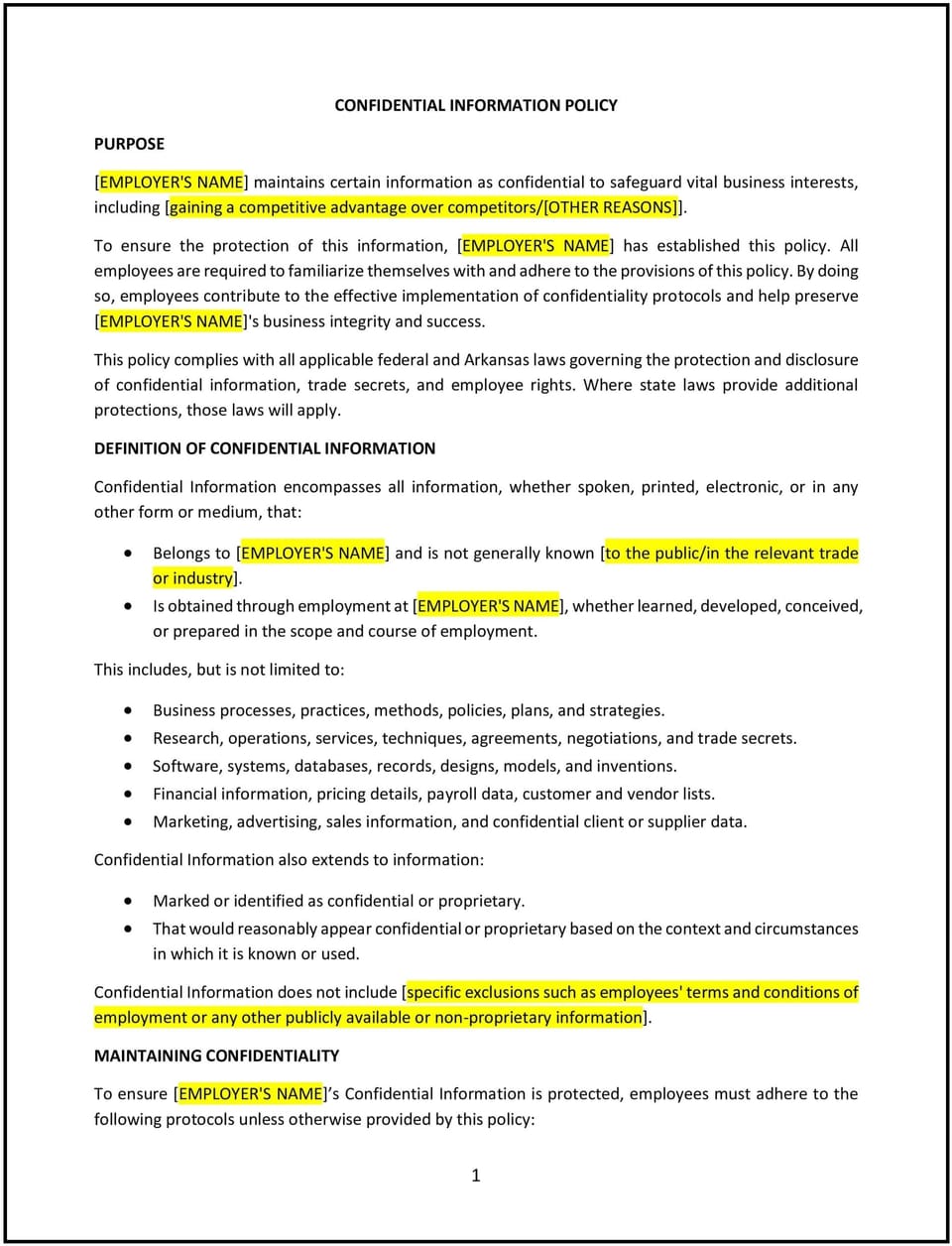Confidential information policy (Arkansas): Free template

Confidential information policy (Arkansas)
In Arkansas, a confidential information policy provides businesses with clear guidelines for protecting sensitive company data and ensuring employees understand their responsibilities regarding confidentiality. This policy safeguards proprietary information, trade secrets, and other confidential materials from unauthorized access, use, or disclosure.
This policy outlines the types of information considered confidential, employee obligations, and the consequences of breaches. By implementing this policy, Arkansas businesses can promote trust, protect their competitive advantage, and support compliance with state and federal data protection laws.
How to use this confidential information policy (Arkansas)
- Define confidential information: Clearly identify the types of information covered, such as financial data, trade secrets, customer lists, and employee records.
- Specify employee responsibilities: Outline employees’ duties to protect confidential information, including secure storage, limited sharing, and proper handling.
- Establish access controls: Implement protocols to restrict access to confidential information, ensuring that only authorized employees can view or use it.
- Address disclosure procedures: Provide guidance on how employees should handle requests for confidential information, including required approvals and documentation.
- Set consequences for breaches: Define the disciplinary actions for employees who fail to comply with the policy, including termination or legal action for severe breaches.
Benefits of using this confidential information policy (Arkansas)
This policy offers several advantages for Arkansas businesses:
- Protects proprietary information: Safeguards critical business data, trade secrets, and intellectual property from unauthorized access or misuse.
- Reduces legal risks: Ensures compliance with Arkansas laws and federal regulations related to data protection, minimizing the risk of lawsuits or penalties.
- Promotes employee accountability: Establishes clear expectations for handling confidential information, encouraging responsible behavior.
- Strengthens stakeholder trust: Demonstrates the business’s commitment to protecting sensitive information, fostering trust among clients, partners, and employees.
- Enhances operational security: Implements structured protocols for managing and securing confidential information, reducing risks of leaks or breaches.
Tips for using this confidential information policy (Arkansas)
- Address Arkansas-specific considerations: Ensure the policy incorporates any state-specific requirements for protecting confidential business or employee data.
- Provide training: Educate employees on best practices for managing confidential information, such as secure password use and safe sharing methods.
- Monitor compliance: Regularly review access logs, conduct audits, and update security measures to ensure ongoing adherence to the policy.
- Clearly communicate the policy: Include the policy in employee handbooks and during onboarding to ensure all employees understand their responsibilities.
- Review regularly: Update the policy as needed to reflect changes in business operations, technology, or legal requirements.
Q: How does this policy benefit the business?
A: This policy protects sensitive business information, reduces legal risks, and fosters trust with stakeholders by ensuring clear protocols for confidentiality and compliance with Arkansas laws.
Q: What types of information are considered confidential under this policy?
A: Confidential information includes trade secrets, financial data, employee records, customer information, and any other proprietary materials specified by the business.
Q: How does this policy support compliance with Arkansas laws?
A: The policy aligns with state and federal regulations on data protection and confidentiality, ensuring that the business meets legal obligations and protects its assets.
Q: What steps should the business take to address breaches of confidentiality?
A: The business should investigate the breach, document findings, take appropriate disciplinary action, and implement measures to prevent future incidents.
Q: How can the business ensure employees adhere to this policy?
A: The business can provide regular training, restrict access to sensitive data, monitor compliance through audits, and enforce consequences for violations.
This article contains general legal information and does not contain legal advice. Cobrief is not a law firm or a substitute for an attorney or law firm. The law is complex and changes often. For legal advice, please ask a lawyer.


